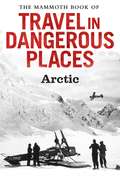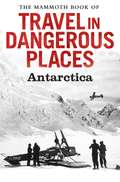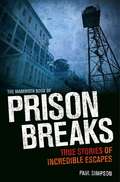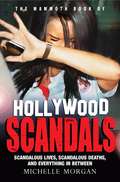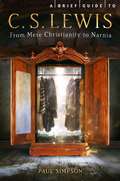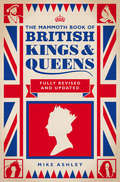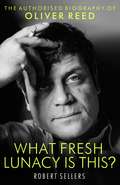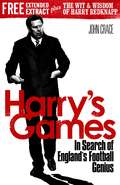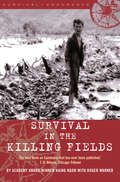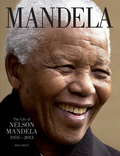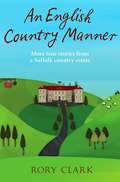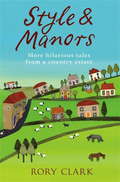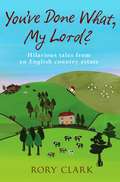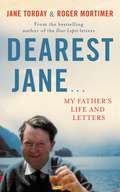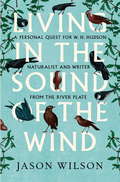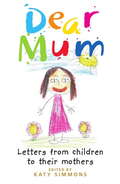- Table View
- List View
The Mammoth Book of Travel in Dangerous Places: Arctic (Mammoth Books #347)
by John KeayFour Years in the Ice - John RossDisgraced and dishonored for his report of an imaginary mountain range blocking the most likely access to the North West Passage, in 1829 Ross returned to Canada's frozen archipelago to vindicate his reputation. He rounded the north of Baffin Island and entered what he named the Gulf of Boothia. Here the Victory, his eccentric paddle-steamer, became frozen to the ice. Through three tantalizingly brief summers the expedition tried to find a way out and through four long winters then endured the worst of Arctic conditions in a makeshift camp. In July 1832, with the ship long since abandoned, Ross made what must be their last bid to reach open water.Living off Lichen and Leather - John FranklinIn 1845, looking again for the North West Passage, two well-crewed ships under Franklin's command sailed into the Canadian Arctic and were never seen again. There began the most prolonged search ever mounted for an explorer. For Franklin had been lost before and yet had survived. In 1821, returning from an overland reconnaissance of the Arctic coast north of Great Slave Lake, he and Dr. John Richardson, with two Lieutenants and about a dozen voyageurs (mostly French), had run out of food and then been overtaken by the Arctic weather. Franklin's narrative of what is probably the grisliest journey on record omits unpalatable details, like the cannibalism of one of his men, the murder of Lieut. Hood, and Richardson's summary shooting of the murderer; but it well conveys the debility of men forced to survive on leather and lichen (triple de roche) plus that sense of demoralization and disintegration that heralds the demise of an expedition.Adrift on an Arctic Ice Floe - Fridtjof Nansen Norwegian patriot, natural scientist, and Nobel laureate, Nansen caught the world's imagination when he almost reached the North Pole in 1895. The attempt was made on skis from specially reinforced vessel which, driven into the ice, was carried from Siberia towards Greenland. The idea stemmed from his first expedition, an 1888 crossing of Greenland. Then too he had used skis and then too, unwittingly and nearly disastrously, he had taken to the ice. Arrived off Greenland's inhospitable east coast, he had ordered his five-man party to spare their vessel by crossing the off-shore ice floe in rowing boats. A task which he expected to take a few hours turned into an involuntary voyage down the coast of twelve days.The Pole is Mine - Robert Edwin Peary Born in Pennsylvania and latterly a commander in the US navy, Peary had set his sights on claiming the North Pole from childhood. It was not just an obsession but a religion, his manifest destiny. Regardless of cost, hardship, and other men's sensibilities, he would be Peary of the Pole, and the Pole would be American. Critics might carp over the hundreds of dogs that were sacrificed to his ambition, over the chain of supply depots that would have done credit to a military advance, and over the extravagance of Peary's ambition, but success, in 1909, came only after a catalogue of failures; and even then it would be disputed. Under the circumstances his triumphalism is understandable and, however distasteful, not unknown amongst other Polar travelers.
The Mammoth Book of Travel in Dangerous Places: Antarctic (Mammoth Books #345)
by John KeayFarthest South - Ernest Henry ShackletonBorn in Ireland, Shackleton joined the merchant navy before being recruited for Captain Scott's 1901 expedition to Antarctica. He was with Scott on his first attempt to reach the South Pole and, though badly shaken by the experience, realized that success was now feasible. In 1907, with a devoted team but little official support, he launched his own expedition. A scientific programme gave it respectability but Shackleton was essentially an adventurer, beguiled alike by the challenge of the unknown and the reward of celebrity. His goal was the Pole, 90 degrees south, and by Christmas 1908 his four-man team were already at 85 degrees.The Pole at Last - Roald AmundsenAmundsen's 1903-6 voyage through North West Passage had heralded a new era in exploration. The route by then was tolerably well known and its environs explored. His vessel was a diminutive fishing smack, his crew a group of Norwegian friends, and his object simply to be the first to have sailed through. He did it because it had not been done and "because it was there". The same applied to his 1911 conquest of the South Pole. Shackleton had shown the way and Amundsen drew the right conclusions. The Pole was not a scientist's playground nor a mystic's dreamland; it was simply a physical challenge. Instead of officers, gentlemen and scientists, he took men who could ski and dogs that could pull; if need be, the former could eat the latter. The only real anxiety was whether they would forestall Scott.In Extremis - Robert Falcon ScottScott was chosen to lead the 1900-4 British National Antarctic Expedition. Its considerable achievements seemed to vindicate the choice of a naval officer more noted for integrity and courage than any polar experience, and, following Shackleton's near success, in 1910 Scott again sailed south intending to combine a busy scientific programme with a successful bid for the South Pole. On 17 January 1912 he and four others duly reached the Pole, indeed they sighted a real pole and it bore a Norwegian flag; Amundsen had got there 34 days ahead of them. Bitterly disappointed, soon overtaken by scurvy and bad weather, and still dragging sledges laden with geological specimens, they trudged back. The tragedy which then unfolded eclipsed even Amundsen's achievement and won them an immortality beyond the dreams of any explorer.
The Mammoth Book of Prison Breaks (Mammoth Books #430)
by Paul SimpsonTrue stories of prison breaks including those of Frank Abagnale, whose story is told in Catch Me If You Can; Henri Charrière who claimed to have escaped from the supposedly inescapable Devil's Island - the true story as opposed to his questionable memoir, Papillon; Bud Day, said to be the only US serviceman ever to have escaped to South Vietnam; the six prisoners who escaped from Death Row in Mecklenburg Correctional Center; and Pascal Payeret, the French armed robber who escaped not once, but twice from French prisons with the help of a helicopter.
The Mammoth Book of Hollywood Scandals (Mammoth Bks.)
by Michelle MorganMurders, suicides, unexplained deaths, scandalous romances, illegitimate children, cover-ups, and more, from the 1920s to Hollywood's Golden Age in the 1960s and right up to the present day.It covers over 60 scandals including: The Roscoe 'Fatty' Arbuckle Scandal; Clark Gable's Baby Scandals; The Rape of Patricia Douglas; The Life and Death of Jean Harlow; The Sudden Death of James Dean; Marilyn Monroe's Mysterious Death; John Belushi Dies at the Chateau Marmont; Madonna's Hollywood Stalker; Hugh Grant's Hollywood Scandal; Winona Ryder Is Arrested For Shoplifting; The Brad Pitt, Jennifer Aniston and Angelina Jolie Love Triangle; The Tragic Life and Death of Anna Nicole Smith; The Life and Death of Michael Jackson; Arnold Schwarzenegger's Love Child; The Very Public Melt-Down of Charlie Sheen; The Rise and Fall of Whitney Houston; The Marriage of Tom Cruise and Katie Holmes and many, many more.
The Mammoth Book of Hollywood Scandals (Mammoth Books #406)
by Michelle MorganMurders, suicides, unexplained deaths, scandalous romances, illegitimate children, cover-ups, and more, from the 1920s to Hollywood's Golden Age in the 1960s and right up to the present day.It covers over 60 scandals including: The Roscoe 'Fatty' Arbuckle Scandal; Clark Gable's Baby Scandals; The Rape of Patricia Douglas; The Life and Death of Jean Harlow; The Sudden Death of James Dean; Marilyn Monroe's Mysterious Death; John Belushi Dies at the Chateau Marmont; Madonna's Hollywood Stalker; Hugh Grant's Hollywood Scandal; Winona Ryder Is Arrested For Shoplifting; The Brad Pitt, Jennifer Aniston and Angelina Jolie Love Triangle; The Tragic Life and Death of Anna Nicole Smith; The Life and Death of Michael Jackson; Arnold Schwarzenegger's Love Child; The Very Public Melt-Down of Charlie Sheen; The Rise and Fall of Whitney Houston; The Marriage of Tom Cruise and Katie Holmes and many, many more.
A Brief Guide to C. S. Lewis: From Mere Christianity to Narnia
by Paul SimpsonNovember 2013 marks the 50th anniversary of the death of Clive Staples 'Jack' Lewis, when a memorial to him will be placed in Poet's Corner in Westminster Abbey. Although perhaps best known as the author of the seven Chronicles of Narnia, published between 1949 and 1954, Lewis also wrote The Pilgrim's Regress, a trilogy of science-fiction novels incorporating Christian themes, and a large number of non-fiction books about his faith, accessible to Christians and non-believers alike. In a survey of the greatest British writers since 1945, the Times newspaper ranked Lewis eleventh, ahead of Salman Rushdie, Anthony Burgess and Ian Fleming.A Brief Guide to C. S. Lewis explores Lewis's life, from his reconversion to Christianity under the influence of his friend J. R. R. Tolkien, which had such a profound influence on his writing - both fiction and non-fiction - to his marriage to American writer Joy Davidman Gresham and his battle with cancer. He died on 22 November 1963, a day before the first-ever episode of Dr Who, a TV series with many links to his Narnia stories was shown. Although this Brief Guide ranges well beyond the world of Narnia to explore other aspects of Lewis's life and his other writings, it does not do so - unusually among books on Lewis - from the point of view of Christian scholarship, thereby assuming much knowledge of theology on the part of readers. That Lewis wrote about the problems of praying is significant; the specific texts he discusses and dissects are likely to be of less significance to most readers.The guide provides synopses of Lewis's fiction, an overview of his other writings, a biography and a look at all the many different versions of his stories that have appeared. In doing so it draws on recent interviews by the author with some of the many talented people who have worked on these adaptations.
A Brief Guide to C. S. Lewis: From Mere Christianity to Narnia (Brief Histories)
by Paul SimpsonNovember 2013 marks the 50th anniversary of the death of Clive Staples 'Jack' Lewis, when a memorial to him will be placed in Poet's Corner in Westminster Abbey. Although perhaps best known as the author of the seven Chronicles of Narnia, published between 1949 and 1954, Lewis also wrote The Pilgrim's Regress, a trilogy of science-fiction novels incorporating Christian themes, and a large number of non-fiction books about his faith, accessible to Christians and non-believers alike. In a survey of the greatest British writers since 1945, the Times newspaper ranked Lewis eleventh, ahead of Salman Rushdie, Anthony Burgess and Ian Fleming.A Brief Guide to C. S. Lewis explores Lewis's life, from his reconversion to Christianity under the influence of his friend J. R. R. Tolkien, which had such a profound influence on his writing - both fiction and non-fiction - to his marriage to American writer Joy Davidman Gresham and his battle with cancer. He died on 22 November 1963, a day before the first-ever episode of Dr Who, a TV series with many links to his Narnia stories was shown. Although this Brief Guide ranges well beyond the world of Narnia to explore other aspects of Lewis's life and his other writings, it does not do so - unusually among books on Lewis - from the point of view of Christian scholarship, thereby assuming much knowledge of theology on the part of readers. That Lewis wrote about the problems of praying is significant; the specific texts he discusses and dissects are likely to be of less significance to most readers.The guide provides synopses of Lewis's fiction, an overview of his other writings, a biography and a look at all the many different versions of his stories that have appeared. In doing so it draws on recent interviews by the author with some of the many talented people who have worked on these adaptations.
The Mammoth Book of British Kings and Queens
by Mike AshleyA record of Britain's kings and queens over 2000 years of history. It includes more than 1000 monarchs who have at some time ruled all or part of Britain. This includes the host of tribal and Saxon rulers prior to 1066 as well as famous monarchs such as Richard III, Elizabeth I and Charles II and all the rulers of Scotland and Wales. The book gives full details of the lives of the rulers as well as their wives, consorts, pretenders, usurpers and regents and is a geographical guide to where all Britain's monarchs lived, ruled and died including their palaces, estates and resting places.
The Mammoth Book of British Kings and Queens (Mammoth Books #164)
by Mike AshleyThis book includes more than 1000 monarchs who have at some time ruled all or part of Britain. This includes the host of tribal and Saxon rulers prior to 1066 as well as famous monarchs such as Richard III, Elizabeth I and Charles II and all the rulers of Scotland and Wales. The book gives full details of the lives of the rulers as well as their wives, consorts, pretenders, usurpers and regents and is a geographical guide to where all Britain's monarchs lived, ruled and died including their palaces, estates and resting places.
What Fresh Lunacy is This?: The Authorized Biography of Oliver Reed
by Robert SellersOliver Reed may not have been Britain's biggest film star - for a period in the early 70s he came within a hairsbreadth of replacing Sean Connery as James Bond - but he is an august member of that small band of people, like George Best and Eric Morecambe, who transcended their chosen medium, became too big for it even, and grew into cultural icons. For the first time Reed's close family has agreed to collaborate on a project about the man himself. The result is a fascinating new insight into a man seen by many as merely a brawling, boozing hellraiser. And yet he was so much more than this. For behind that image, which all too often he played up to in public, was a vastly complex individual, a man of deep passions and loyalty but also deep-rooted vulnerability and insecurities. Why was a proud, patriotic, intelligent, successful and erudite man so obsessed about proving himself to others, time and time again?Although the Reed myth is of Homeric proportions, he remains a national treasure and somewhat peculiar icon.
What Fresh Lunacy is This?: The Authorized Biography of Oliver Reed
by Robert SellersOliver Reed may not have been Britain's biggest film star - for a period in the early 70s he came within a hairsbreadth of replacing Sean Connery as James Bond - but he is an august member of that small band of people, like George Best and Eric Morecambe, who transcended their chosen medium, became too big for it even, and grew into cultural icons.For the first time Reed's close family has agreed to collaborate on a project about the man himself. The result is a fascinating new insight into a man seen by many as merely a brawling, boozing hellraiser. And yet he was so much more than this. For behind that image, which all too often he played up to in public, was a vastly complex individual, a man of deep passions and loyalty but also deep-rooted vulnerability and insecurities. Why was a proud, patriotic, intelligent, successful and erudite man so obsessed about proving himself to others, time and time again?Although the Reed myth is of Homeric proportions, he remains a national treasure and somewhat peculiar icon.Praise for other books by Robert Sellers:Hellraisers: The Life and Inebriated Times of Richard Burton, Richard Harris, Peter O'Toole, and Oliver Reed: 'So wonderfully captures the wanton belligerence of both binging and stardom you almost feel the guys themselves are telling the tales.' GQ.Vic Armstrong: The True Adventures of the World's Greatest Stuntman:'This is the best and most original behind-the-scenes book I have read in years, gripping and revealing.' Roger Lewis, Daily Mail.Don't Let the Bastards Grind You Down: '...a rollicking good read... Sellers has done well to capture a vivid snapshot of this exciting time.' Lynn Barber, Sunday Times.
Harry's Games, Wit and Wisdom: In Search Of England's Football Genius
by John CraceA FREE extended extract from the forthcoming biography of Harry Redknapp, including the Wit & Wisdom of the greatest football manager England never had (with apologies to Brian Clough).Who is Harry Redknapp? Football genius or football chancer? Master tactician or practical joker? How is it that even when he was facing court proceedings for tax evasion so many people were still seriously tipping him to be the next England manager? How can one man have two such diametrically opposed and incompatible career trajectories? Does the longing to have an English manager in charge of the national side warp people's thinking?'To Portsmouth fans, Redknapp was the man who walked on water and won them an FA Cup. To Southampton fans, he is still the devil incarnate who had them relegated before jumping ship to their arch rivals. Spurs fans weren't sure what he was, bit didn't care as long as he kept the team together and winning. Sometimes he's the Messiah, at others the clown. Whoever he is, Crace is determined to find out.
Survival in the Killing Fields
by Haing NgorBest known for his academy award-winning role as Dith Pran in "The Killing Fields", for Haing Ngor his greatest performance was not in Hollywood but in the rice paddies and labour camps of war-torn Cambodia. Here, in his memoir of life under the Khmer Rouge, is a searing account of a country's descent into hell. His was a world of war slaves and execution squads, of senseless brutality and mind-numbing torture; where families ceased to be and only a very special love could soar above the squalor, starvation and disease. An eyewitness account of the real killing fields by an extraordinary survivor, this book is a reminder of the horrors of war - and a testament to the enduring human spirit.
Survival in the Killing Fields
by Haing NgorBest known for his academy award-winning role as Dith Pran in "The Killing Fields", for Haing Ngor his greatest performance was not in Hollywood but in the rice paddies and labour camps of war-torn Cambodia. Here, in his memoir of life under the Khmer Rouge, is a searing account of a country's descent into hell. His was a world of war slaves and execution squads, of senseless brutality and mind-numbing torture; where families ceased to be and only a very special love could soar above the squalor, starvation and disease. An eyewitness account of the real killing fields by an extraordinary survivor, this book is a reminder of the horrors of war - and a testament to the enduring human spirit.
Mandela: The Life of Nelson Mandela
by Rod GreenThere can't be many people who have never heard of Nelson Mandela. His has become a household name, a name respected by everyone everywhere, from grandmothers to schoolchildren. Not so many people would recognise his other names, and he is a man who has been known by many names throughout his life. Nelson Rolihlahla Dalibhunga Mandela came from what most people would regard as a poor background, yet his family were aristocrats among the Xhosa people of the Transkei in South Africa. From the time he was a boy he was destined, as his father before him had been, to become an advisor at the court of the Xhosa king, but no one could have predicted that young Rolihlahla would one day become an outlaw known as 'The Black Pimpernel' or a statesman of international standing - President Mandela.This is a fully illustrated life story of Nelson Mandela with a unique collection of photographs from throughout his life.
An English Country Manner: More true stories from a Suffolk country estate
by Rory ClarkJames Aden has his hands full when he leaves the comparative sanity of a job on an estate in Scotland when his wife inherits a farm in Suffolk. To supplement the income from the farm, he takes a job as an agent on Sir Charles Buckley's vast estate. The list of problems, and problematic characters, that he has to deal with is virtually endless with rogue chimney pots, unsavoury tenants and delinquent sheep giving him frought days and sleepless nights. There's no point in counting sheep to get to sleep when they simply won't do as they're told. Then there's the farm secretary, Gail, whose turbulent love life provides James with even more headaches than the troublesome sheep, without even the prospect of a decent Sunday roast to look forward to once the troublemakers have been put out of their misery!
An English Country Manner: More true stories from a Suffolk country estate
by Rory ClarkJames Aden has his hands full when he leaves the comparative sanity of a job on an estate in Scotland when his wife inherits a farm in Suffolk. To supplement the income from the farm, he takes a job as an agent on Sir Charles Buckley's vast estate. The list of problems, and problematic characters, that he has to deal with is virtually endless with rogue chimney pots, unsavoury tenants and delinquent sheep giving him frought days and sleepless nights. There's no point in counting sheep to get to sleep when they simply won't do as they're told. Then there's the farm secretary, Gail, whose turbulent love life provides James with even more headaches than the troublesome sheep, without even the prospect of a decent Sunday roast to look forward to once the troublemakers have been put out of their misery!
Style and Manors: Rustic tales from a Suffolk country estate
by Rory ClarkContinuing his memoirs of his time on Sir Charles Buckley's estate, James Aden deals with obstacles from the discovery of Roman treasure to the tramp living in the attic of Frampton Hall; he finds his days varied, especially with the arrival of Sir Charles's heir, Sebastian who provides him with insights into the life of the traditional landed estates as they slowly come to terms with the twenty first century.
You've Done What, My Lord?: Hilarious tales from a country estate
by Rory ClarkRumshott is one of the finest landed estates in England. However, when James Aden takes up the position of Deputy Agent he does not realise the full extent of what the job entails.He finds himself spending his days negotiating with royalty, farmers, and even wildlife, as well as the imperious Lady Leghorn. In order to survive, James must come to terms with his role quickly, and not let himself get too distracted by Sophie, the pre-college assistant.
You've Done What, My Lord?: Hilarious tales from a country estate
by Rory ClarkRumshott is one of the finest landed estates in England. However, when James Aden takes up the position of Deputy Agent he does not realise the full extent of what the job entails.He finds himself spending his days negotiating with royalty, farmers, and even wildlife, as well as the imperious Lady Leghorn. In order to survive, James must come to terms with his role quickly, and not let himself get too distracted by Sophie, the pre-college assistant.
Dearest Jane...: My Father's Life and Letters
by Jane Torday Roger MortimerAs the eldest daughter of a prolific letter writer, Jane Torday received hundreds of letters from her father over the years. From irreverent advice and hilarious family anecdotes to moments of great poignancy, Roger Mortimer`s missives are a touching and witty portrait of his life and relationships over the years.Dearest Jane begins with Roger?s time as a young army officer in Egypt, and then as a POW in the Second World War, where his sense of humour endured despite the conditions. Jane accompanies her father?s letters with her own memories and anecdotes, as we meet familiar characters such as Nidnod, Lupin and Lumpy, and learn more about the extended family, friends and pets who leap from the pages of his letters. This is an arresting and extraordinary record, not only of Roger Mortimer?s life but also of the history of an entire family between 1960 and 1991. Sparkling with the dry wit for which Mortimer?s letters are famous, and accompanied by an affectionate personal portrait, this book will delight both old and new readers.
Dearest Jane...: My Father's Life and Letters
by Jane Torday Roger MortimerAs the eldest daughter of a prolific letter writer, Jane Torday received hundreds of letters from her father over the years. From irreverent advice and hilarious family anecdotes to moments of great poignancy, Roger Mortimer‘s missives are a touching and witty portrait of his life and relationships over the years.Dearest Jane begins with Roger’s time as a young army officer in Egypt, and then as a POW in the Second World War, where his sense of humour endured despite the conditions. Jane accompanies her father’s letters with her own memories and anecdotes, as we meet familiar characters such as Nidnod, Lupin and Lumpy, and learn more about the extended family, friends and pets who leap from the pages of his letters. This is an arresting and extraordinary record, not only of Roger Mortimer’s life but also of the history of an entire family between 1960 and 1991. Sparkling with the dry wit for which Mortimer’s letters are famous, and accompanied by an affectionate personal portrait, this book will delight both old and new readers.
Living in the Sound of the Wind: A Personal Quest for W.H. Hudson, Naturalist and Writer from the River Plate
by Jason WilsonW. H. Hudson was brought up on the pampas, where he learnt from gauchos about frontier life. After moving to London in 1874, Hudson lived in extreme poverty. Like his friend Joseph Conrad, Hudson was an exile, adapting to England. He never returned to Argentina.Wilson unravels Hudson’s English dream, his natural history rambles, and his work to protect birds. He remains both a complex witness to his homeland before mass immigration and to his England of the mind, before the urban sprawl.Praise for Jason Wilson: Tireless, shrewd, erudite Jason Wilson, mixing hard fact and anthology, provides the perfect outfit of allusion and comparative experience - Jonathan Keates, ObserverPut his treasure trove into your pocket. - Anthony Sattin, Sunday TimesThe idea is so simple that it must be original. This inaugural book might prove to be a landmark. - Nicholas Shakespeare, Daily Telegraph
Dear Mum
by Alison MorganWhen Katy Simmons packed all three of her daughters off to their grandmother's house for a few days during their school summer holidays in order to get some work done in peace and quiet, she expected to talk to them on the phone, she knew that her eldest would send her a text now and again, she was even thinking about getting granny to set up Skype - but she never expected them each to send her a letter. She realised that Granny was responsible. Letters are such old-fashioned things, after all ... or are they? Talking to her friends, she soon realised that writing to Mum wasn't such a rare occurrence for other kids who were away from home. Some were encouraged to do so at school and others even liked to leave notes around the house for their mothers to find. Of course, when embarking on the huge task of writing a letter, you don't waste too much time on trivia. Letters are for important stuff - and it's what the children who wrote the letters that are featured in this book found important that make them so fascinating to read.
Dear Mum
by Alison MorganWhen Katy Simmons packed all three of her daughters off to their grandmother's house for a few days during their school summer holidays in order to get some work done in peace and quiet, she expected to talk to them on the phone, she knew that her eldest would send her a text now and again, she was even thinking about getting granny to set up Skype - but she never expected them each to send her a letter. She realised that Granny was responsible. Letters are such old-fashioned things, after all ... or are they? Talking to her friends, she soon realised that writing to Mum wasn't such a rare occurrence for other kids who were away from home. Some were encouraged to do so at school and others even liked to leave notes around the house for their mothers to find. Of course, when embarking on the huge task of writing a letter, you don't waste too much time on trivia. Letters are for important stuff - and it's what the children who wrote the letters that are featured in this book found important that make them so fascinating to read.
